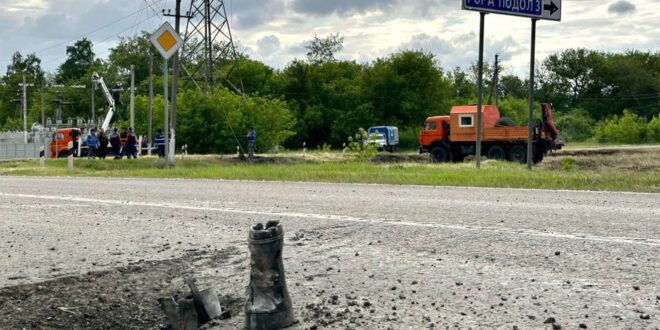An attack by an armed group on a Russian region bordering Ukraine earlier this week has been met with a mixture of shock, anger and indifference, according to six interviews with locals conducted by The Moscow Times.
The Belgorod region, which lies across the border from Ukraine’s second-largest city Kharkiv, has reported regular shelling and drone attacks in the 15 months since Moscow launched its full-scale invasion of its neighbor.
But Monday’s incursion — which Russia blames on Ukraine’s army and which Kyiv says was carried out by an anti-Kremlin militia made of Russian citizens — was unprecedented in its intensity, with more than 24 hours passing before the fighting apparently ended.
“We f***ed up,” said Pavel, 33, a taxi driver from Belgorod city, told The Moscow Times by telephone. “Where were Russia’s Armed Forces? I don’t understand.”
According to Russian officials, a Ukrainian “sabotage group” infiltrated Belgorod’s Grayvoron district on Monday as the area came under sustained artillery and mortar fire.
“Civilians were running from the shelling in a rush,” said Yevgeny, a Belgorod region resident who, like the others interviewed for this article, requested anonymity to speak freely.
“Some of my friends were wounded. The situation was terrible.”
At least one civilian was killed and nine people injured in the attack, Belgorod Governor Vyacheslav Gladkov wrote Wednesday on his Telegram channel. Some 550 residents of the Grayvoron district were temporarily evacuated, according to Gladkov.
Many expressed fears that the city of Belgorod could end up like the Ukrainian cities of Kharkiv or Mariupol, which were both heavily damaged by invading Russian forces last year.
“Since the beginning of the ‘special military operation’ there has been a feeling that you might lose your home,” said 31-year-old Lyudmila, an event organizer, who used the term for the war in Ukraine preferred by Russian officials.
“These thoughts are always in your mind.”
According to a Wednesday report by Russian independent media outlet 7×7, conscripts undergoing their compulsory military service have been dispatched to boost the military’s defenses on the Belgorod region’s border with Ukraine.
Some Belgorod residents questioned whether the Russian military — which is currently braced for a Ukrainian counteroffensive — was able to defend the border.
“They said there were only border guards defending the place, the army was absent,” said taxi driver Pavel.
In a video interview on Tuesday, Gladkov also seemed to question the military’s handling of the incident, saying he had “even more questions than you” for the Defense Ministry.
At the same time, some people in the Belgorod region told The Moscow Times that they were already used to cross-border attacks from Ukraine.
Incidents of shelling and mortar fire increased significantly since Kyiv re-took large areas of the Kharkiv region from Russian forces late last year.
“People are in shock, but there’s no panic,” one woman from Belgorod said in a phone interview. “People are not leaving, I think everyone has decided to wait and see.”
But she admitted that, nonetheless, that “those who support the war feel abandoned.”
Speaking Wednesday, Russian Defense Minister Sergei Shoigu said Russia would “respond promptly and extremely harshly to terrorist actions by Ukrainian militants similar to the attack in the Belgorod region.”
The Kremlin offered no criticism of the military’s response to the Belgorod incursion and implied it was not worried about the incident.
“Our military, border guards and appropriate services are doing their work,” President Vladimir Putin’s spokesman Dmitry Peskov said Wednesday, referring to the security services.
Responsibility for the attack was claimed by two anti-Kremlin groups — the Freedom of Russia Legion and the Russian Volunteer Corps — that are reportedly mostly made up of Russian citizens. Kyiv denied it was involved.
Media reports have suggested that some of those involved in these militias are affiliated with far-right groups.
According to locals, neither organization was likely to be welcomed in Belgorod.
“I didn’t know that these guys are Russians who want to liberate Russia. Even if this is the case, they are not popular. Like it or not, the majority of people support the government’s policies,” said Belgorod region resident Anton, 41.
Another local echoed Anton’s sentiment.
“At the end of the day everybody here supports Putin, the government, and this war,” said a businessman from the Belgorod border town of Shebekino.
“Anything that is done against Putin is perceived as bad.”
 Eurasia Press & News
Eurasia Press & News



